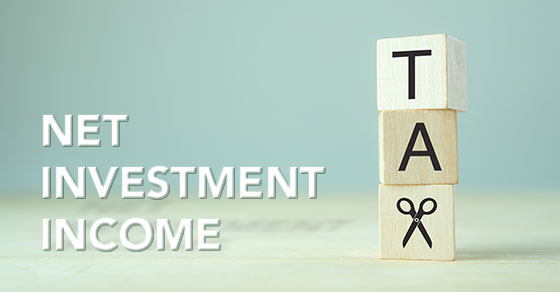High-income taxpayers face a regular income tax rate of 35% or 37%. And they may also have to pay a 3.8% net investment income tax (NIIT) that’s imposed in addition to regular income tax. Fortunately, there are some ways you may be able to reduce its impact.
Affected taxpayers
The NIIT applies to you only if modified adjusted gross income (MAGI) exceeds:
- $250,000 for married taxpayers filing jointly and surviving spouses,
- $125,000 for married taxpayers filing separately,
- $200,000 for unmarried taxpayers and heads of household.
The amount subject to the tax is the lesser of your net investment income or the amount by which your MAGI exceeds the threshold ($250,000, $200,000, or $125,000) that applies to you.
Net investment income includes interest, dividend, annuity, royalty and rental income, unless those items were derived in the ordinary course of an active trade or business. In addition, other gross income from a trade or business that’s a passive activity is subject to the NIIT, as is income from a business trading in financial instruments or commodities.
There are many types of income that are exempt from the NIIT. For example, tax-exempt interest and the excluded gain from the sale of your main home aren’t subject to the tax. Distributions from qualified retirement plans aren’t subject to the NIIT. Neither are Social Security benefits. Wages and self-employment income also aren’t subject to the NIIT, though they may be subject to a different Medicare surtax.
It’s important to remember the NIIT applies only if you have net investment income and your MAGI exceeds the applicable thresholds above. But by following strategies, you may be able to minimize your net investment income.
Shifting investments
If your income is high enough to trigger the NIIT, shifting some income investments to tax-exempt bonds could result in less exposure to the tax. Tax-exempt bonds lower your MAGI and avoid the NIIT.
Dividend-paying stocks are taxed more heavily as a result of the NIIT. The maximum income tax rate on qualified dividends is 20%, but the rate becomes 23.8% with the NIIT.
As a result, you may want to consider rebalancing your investment portfolio to emphasize growth stocks over dividend-paying stocks. While the capital gains from these investments will be included in net investment income, there are two potential benefits: 1) the tax will be deferred because the capital gains won’t be subject to the NIIT until the stocks are sold, and 2) capital gains can be offset by capital losses, which isn’t the case with dividends.
Retirement plan distributions
Because distributions from qualified retirement plans are exempt from the NIIT, upper-income taxpayers with some control over their situations (such as small business owners) might want to make greater use of qualified plans.
These are only a couple of strategies you may be able to employ. You also may be able to make moves related to charitable donations, passive activities and rental income that may allow you to minimize the NIIT. If you’re subject to the tax, you should include it in your tax planning. Contact us for strategies in your situation.
© 2023



